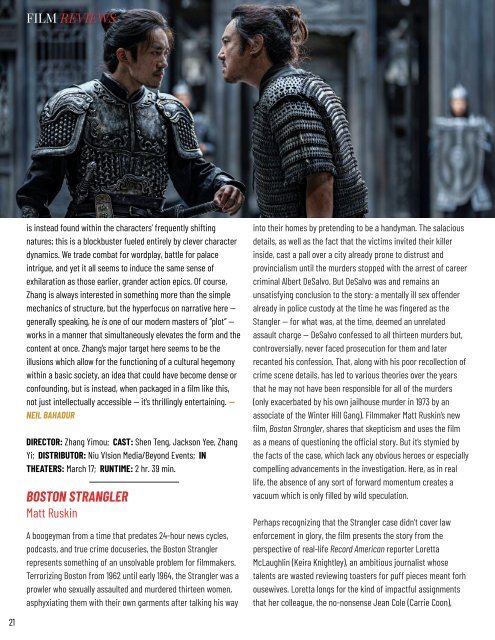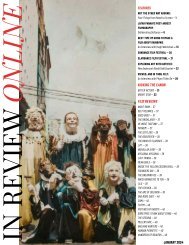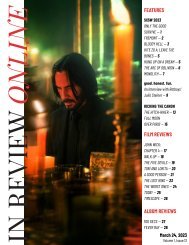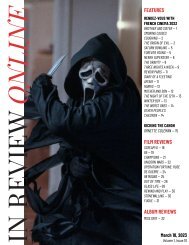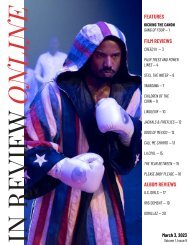Create successful ePaper yourself
Turn your PDF publications into a flip-book with our unique Google optimized e-Paper software.
FILM REVIEWS<br />
is instead found within the characters’ frequently shifting<br />
natures; this is a blockbuster fueled entirely by clever character<br />
dynamics. We trade combat for wordplay, battle for palace<br />
intrigue, and yet it all seems to induce the same sense of<br />
exhilaration as those earlier, grander action epics. Of course,<br />
Zhang is always interested in something more than the simple<br />
mechanics of structure, but the hyperfocus on narrative here <strong>—</strong><br />
generally speaking, he is one of our modern masters of “plot” <strong>—</strong><br />
works in a manner that simultaneously elevates the form and the<br />
content at once. Zhang’s major target here seems to be the<br />
illusions which allow for the functioning of a cultural hegemony<br />
within a basic society, an idea that could have become dense or<br />
confounding, but is instead, when packaged in a film like this,<br />
not just intellectually accessible <strong>—</strong> it’s thrillingly entertaining. <strong>—</strong><br />
NEIL BAHADUR<br />
DIRECTOR: Zhang Yimou; CAST: Shen Teng, Jackson Yee, Zhang<br />
Yi; DISTRIBUTOR: Niu VIsion Media/Beyond Events; IN<br />
THEATERS: March 17; RUNTIME: 2 hr. 39 min.<br />
BOSTON STRANGLER<br />
Matt Ruskin<br />
A boogeyman from a time that predates 24-hour news cycles,<br />
podcasts, and true crime docuseries, the Boston Strangler<br />
represents something of an unsolvable problem for filmmakers.<br />
Terrorizing Boston from 1962 until early 1964, the Strangler was a<br />
prowler who sexually assaulted and murdered thirteen women,<br />
asphyxiating them with their own garments after talking his way<br />
into their homes by pretending to be a handyman. The salacious<br />
details, as well as the fact that the victims invited their killer<br />
inside, cast a pall over a city already prone to distrust and<br />
provincialism until the murders stopped with the arrest of career<br />
criminal Albert DeSalvo. But DeSalvo was and remains an<br />
unsatisfying conclusion to the story: a mentally ill sex offender<br />
already in police custody at the time he was fingered as the<br />
Stangler <strong>—</strong> for what was, at the time, deemed an unrelated<br />
assault charge <strong>—</strong> DeSalvo confessed to all thirteen murders but,<br />
controversially, never faced prosecution for them and later<br />
recanted his confession. That, along with his poor recollection of<br />
crime scene details, has led to various theories over the years<br />
that he may not have been responsible for all of the murders<br />
(only exacerbated by his own jailhouse murder in 1973 by an<br />
associate of the Winter Hill Gang). Filmmaker Matt Ruskin’s new<br />
film, Boston Strangler, shares that skepticism and uses the film<br />
as a means of questioning the official story. But it’s stymied by<br />
the facts of the case, which lack any obvious heroes or especially<br />
compelling advancements in the investigation. Here, as in real<br />
life, the absence of any sort of forward momentum creates a<br />
vacuum which is only filled by wild speculation.<br />
Perhaps recognizing that the Strangler case didn’t cover law<br />
enforcement in glory, the film presents the story from the<br />
perspective of real-life Record American reporter Loretta<br />
McLaughlin (Keira Knightley), an ambitious journalist whose<br />
talents are wasted reviewing toasters for puff pieces meant forh<br />
ousewives. Loretta longs for the kind of impactful assignments<br />
that her colleague, the no-nonsense Jean Cole (Carrie Coon),<br />
17 21


